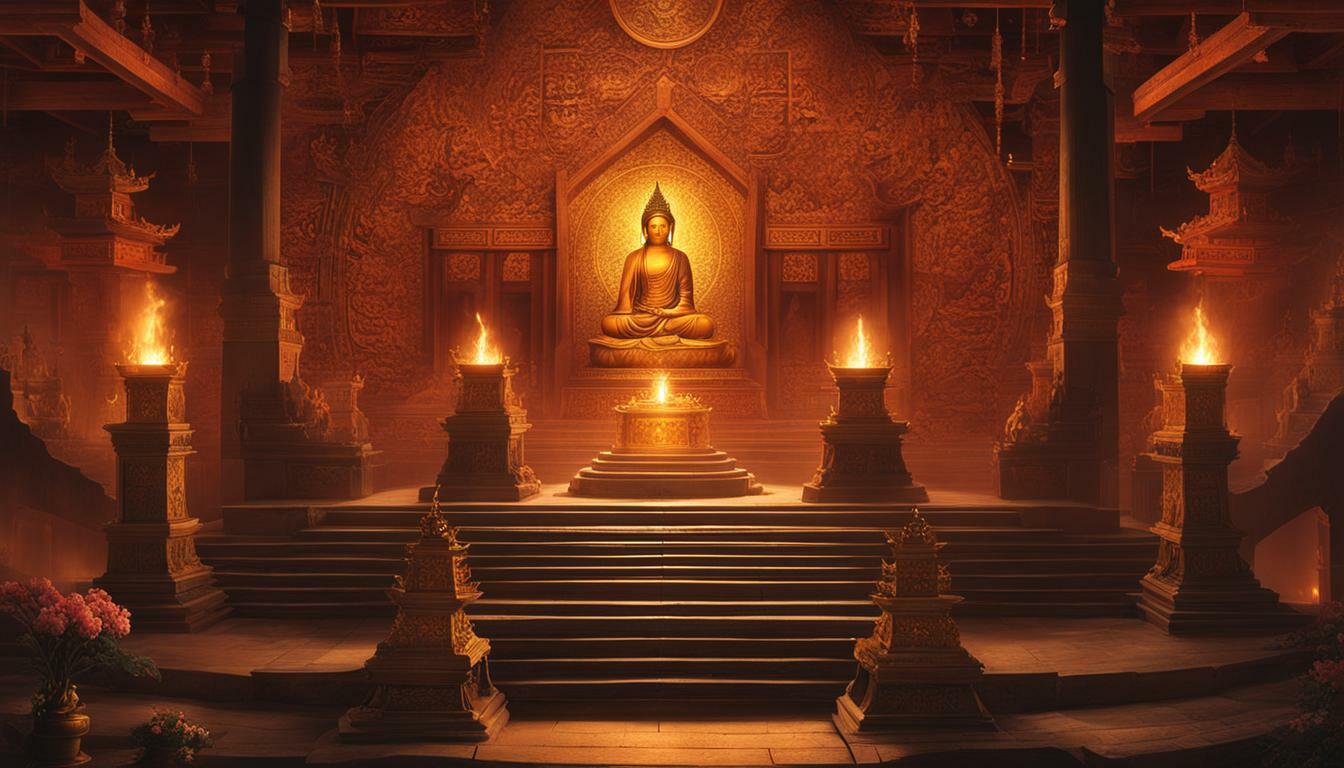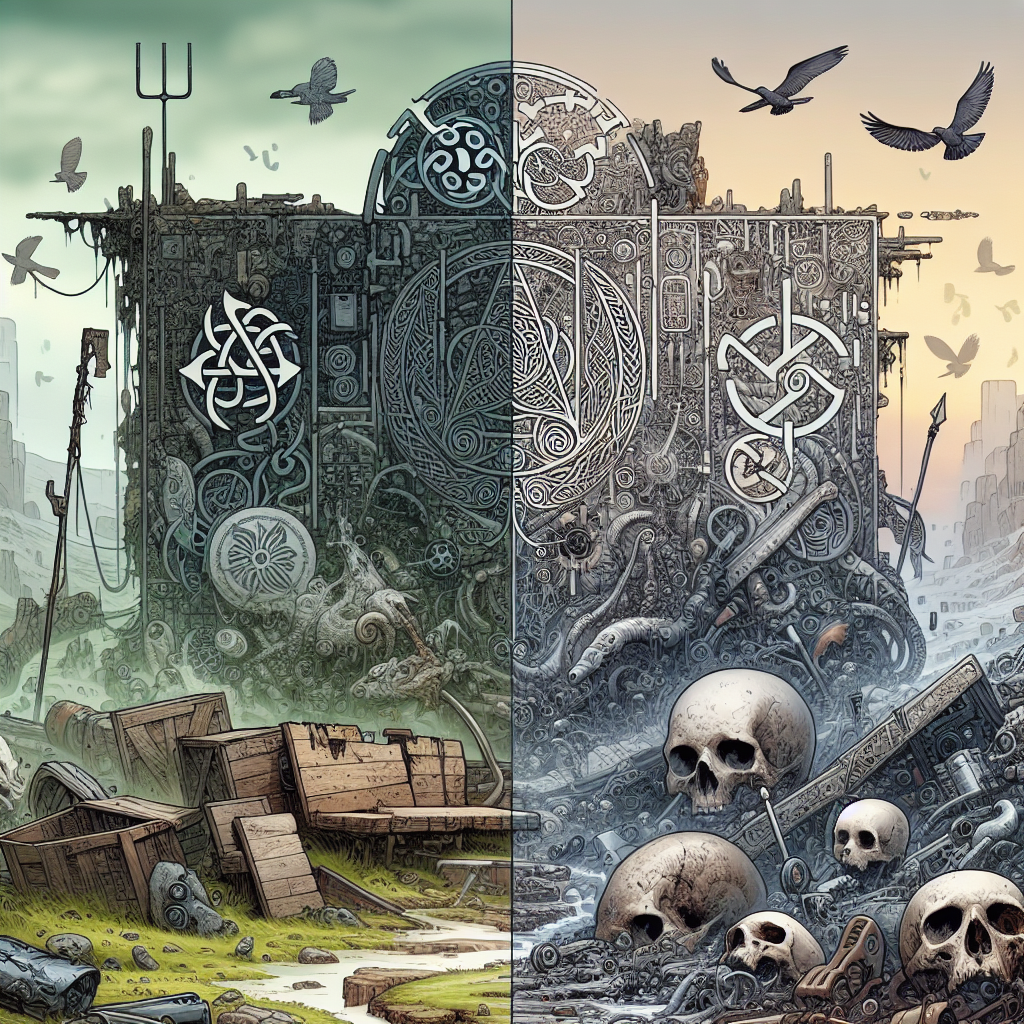Throughout history, various religions have developed their unique interpretations of the afterlife. For Christians and Buddhists alike, the concept of Hell plays a significant role in their beliefs about what happens to the soul after death.
In this article, we will delve into the differences between Christian and Buddhist Hell. We will explore the beliefs and teachings of each faith regarding the afterlife and how it relates to the concept of Hell. By understanding these divergent perspectives, we can gain a more comprehensive understanding of the human experience and the afterlife.
Key Takeaways
- Christian and Buddhist beliefs about Hell differ significantly.
- Christians view Hell as eternal punishment for sin, while Buddhists view it as one of many undesirable states of existence.
- Christians believe in the possibility of redemption even after entering Hell, while Buddhists focus on purifying negative karma to escape Hell.
Christian Teachings on Hell
In Christianity, Hell is often associated with a place of eternal punishment for sinners. The concept of Hell is rooted in the Christian belief in a divine judgment that will determine a person’s fate in the afterlife. This judgment is based on one’s actions, beliefs, and faith during their lifetime.
While interpretations of Hell vary among different Christian denominations, the general belief is that Hell is a place of separation from God, where one suffers for their sins. The severity, duration, and nature of this suffering are debated among Christians, with some believing in literal fire and brimstone, while others view Hell as a metaphorical state of torment.
Christian teachings also emphasize the significance of Hell in the afterlife as a means of divine justice and a deterrent from sin. It is believed that Hell serves as a consequence of human free will and a reminder of the consequences of rejecting God’s love and mercy.
Despite the severity of Hell’s punishment in Christian theology, there is also the belief in the possibility of redemption even after entering Hell. According to some Christian teachings, Hell is not an eternal sentence, and there is always the potential for repentance and forgiveness.
Buddhist Teachings on Hell
In Buddhism, the concept of Hell is rather different from the Christian perspective. For one, Buddhism teaches that there are multiple realms of existence, and Hell is just one of them. According to Buddhist teachings, one’s actions in life determine their rebirth into one of the six realms of existence: the gods, the demigods, humans, animals, hungry ghosts, and Hell. Therefore, Hell is viewed as a consequence of negative karma and a manifestation of one’s own mind.
In Buddhist beliefs, Hell is seen as a place of great suffering and torment, where individuals are punished for their negative actions. However, it is important to note that Hell is not a permanent state in Buddhist theology. According to Buddhist teachings, all beings have the potential for enlightenment and liberation, including those in Hell. This is achieved through spiritual practice, such as meditation, and the accumulation of positive karma.
It is also worth noting that within Buddhist teachings, Hell is not a place of eternal punishment. Rather, individuals are reborn into different realms of existence based on their karma and the nature of their actions in life. Therefore, the duration of one’s stay in Hell is not fixed, and it may be possible to leave Hell sooner through the accumulation of positive karma.
Overall, the Buddhist perspective on Hell is one that emphasizes personal responsibility and the possibility of redemption through spiritual practice. Through the accumulation of positive karma and the cultivation of one’s own mind, it is possible to achieve liberation, even from the most undesirable states of existence such as Hell.
Differences in Interpretation
While both Christianity and Buddhism have a concept of Hell, there are significant differences in how each religion interprets and understands it. One of the main differences is in the nature of Hell itself. In Christianity, Hell is often viewed as a physical place of eternal punishment for sinners. However, in Buddhism, Hell is seen as a state of existence that one can enter into due to negative karma and actions.
Another significant difference is in the criteria for entering Hell. In Christianity, the criteria for entering Hell is often related to one’s belief in God and salvation through Jesus Christ. In contrast, Buddhism focuses on the individual’s karma and actions, and one’s entry into Hell is determined by the accumulation of negative karma.
Additionally, the potential paths for redemption or liberation from Hell vary between the two religions. In Christianity, the belief in the possibility of redemption even after entering Hell is a fundamental part of the faith. In contrast, Buddhism teaches that the only way to escape Hell is through spiritual practice and the accumulation of positive karma.
Overall, while both Christianity and Buddhism have a concept of Hell, the fundamental differences in interpretation highlight the contrasting beliefs and teachings of these two religions.
The Purpose of Hell in Christianity
In Christianity, Hell is viewed as a means of divine justice. It is the place where those who have rejected God and lived a life of sin will be punished for their actions. Hell is not viewed as a place of physical torture, but rather an eternal separation from God and his love. This separation is seen as the ultimate consequence of rejecting the salvation and forgiveness offered through Jesus Christ.
Hell is also viewed as a deterrent against sin. Christians believe that the knowledge of the existence of Hell can motivate people to choose a life of goodness and righteousness. As Jesus himself said, “What good will it be for someone to gain the whole world, yet forfeit their soul?” (Matthew 16:26)
Furthermore, Hell is seen as a consequence of human free will. Christians believe that God has given humans the ability to choose between good and evil, and that the choices we make have eternal consequences. Those who choose to reject God and live a life of sin will be held accountable for their actions and will face eternal separation from Him.
Despite the severity of these beliefs, Christians also embrace the possibility of redemption even after entering Hell. The concept of repentance and the possibility of forgiveness through the blood of Jesus Christ are central to Christian theology, offering hope even to those who have seemingly passed beyond the point of no return.
The Purpose of Hell in Buddhism
Buddhism views Hell as one of the undesirable states of existence that can be experienced due to negative karma. The concept of karma plays a crucial role in Buddhist teachings on Hell, as it is believed that negative actions can result in negative consequences in future lives. Thus, Hell is seen as a consequence of negative deeds committed in a previous life. The ultimate goal in Buddhism is to attain enlightenment and escape the cycle of rebirth, which includes the undesirable realm of existence that is Hell.
However, Hell is not viewed solely as a place of eternal punishment in Buddhism. Rather, it is seen as a means of purifying negative karma. It is believed that the experiences in Hell can eventually lead to the purification of negative karma and the potential for rebirth in a higher realm of existence. Spiritual practice, such as meditation, can also aid in the purification of negative karma and the liberation from Hell.
Reconciliation and Synthesis of Beliefs
While Christianity and Buddhism have varying beliefs about Hell, there is potential for finding common ground and reconciling these perspectives. By engaging in dialogue and seeking to understand the perspectives of each faith, it is possible to develop a deeper appreciation for the diversity of human spirituality.
“In the end, what matters most is not which religion we belong to, but how we live our lives.”
One potential avenue for reconciliation is to explore the similarities between Christianity and Buddhism in terms of their ethical teachings. Both religions emphasize the importance of compassion, kindness, and moral conduct. By focusing on these shared values, it is possible to bridge the gap between these differing beliefs about Hell.
Another approach is to consider the possibility of synthesis, where elements of both beliefs are integrated into a new perspective. This could involve exploring the similarities and differences between the ideas of Hell in Christianity and Buddhism, and seeking to develop a more comprehensive understanding that incorporates both perspectives.
While there may always be differences in beliefs about Hell between Christianity and Buddhism, it is important to recognize and celebrate this diversity, and to seek common ground and understanding wherever possible. By embracing the richness of human spirituality, we can learn from each other and grow together as a global community.
Christianity vs. Buddhism on Hell
The Difference Between Christian and Buddhist Hell
In this article, we have explored the contrasting concepts of Hell in Christianity and Buddhism. Throughout the article, we have examined the beliefs and teachings of each faith regarding the afterlife and how it relates to the concept of Hell. We have delved into the Christian and Buddhist understandings of Hell, explored differences in interpretation, and examined the purpose of Hell in each faith.
Conclusion
While there are significant differences between Christian and Buddhist interpretations of Hell, understanding these divergent perspectives can contribute to a more comprehensive understanding of the human experience and the afterlife. The Christian belief in Hell as a means of divine justice, deterrent from sin, and consequence of human free will contrasts with the Buddhist understanding of Hell as a means of purifying negative karma and a consequence of negative actions. However, both religions offer the possibility of redemption and liberation from Hell through spiritual practice. Further dialogue and understanding between these different perspectives can lead to a deeper appreciation of the diversity of human beliefs and experiences.
Thank you for reading this article on the difference between Christian and Buddhist Hell.
FAQ
Q: What is the difference between Christian and Buddhist Hell?
A: Christian Hell is a place of eternal punishment for sin, while Buddhist Hell is one of the undesirable states of existence within the cycle of rebirth.
Q: What are the Christian teachings on Hell?
A: Christian teachings vary, but generally include the belief in Hell as a consequence of sin and a place of separation from God.
Q: What are the Buddhist teachings on Hell?
A: In Buddhism, Hell is seen as one of the realms of existence where negative actions and karma can lead to suffering and purification.
Q: How do Christian and Buddhist interpretations of Hell differ?
A: The main differences lie in the nature of Hell, the criteria for entering Hell, and the potential paths for redemption or liberation from Hell.
Q: What is the purpose of Hell in Christianity?
A: Hell is viewed in Christianity as a means of divine justice, a deterrent from sin, and a consequence of human free will. Redemption is still believed possible even after entering Hell.
Q: What is the purpose of Hell in Buddhism?
A: In Buddhism, Hell serves as a consequence of negative actions and a means of purifying negative karma. There is also a belief in the potential for liberation from Hell through spiritual practice.
Q: Is it possible to reconcile the beliefs about Hell in Christianity and Buddhism?
A: While there are significant differences, finding common ground and fostering dialogue can contribute to understanding and the synthesis of these differing perspectives.
Q: What have we learned about the difference between Christian and Buddhist Hell?
A: Through exploring the distinct interpretations of Hell in Christianity and Buddhism, we have gained insights into the teachings, beliefs, and purposes of Hell in each faith.
 Skip to main content
Skip to main content


